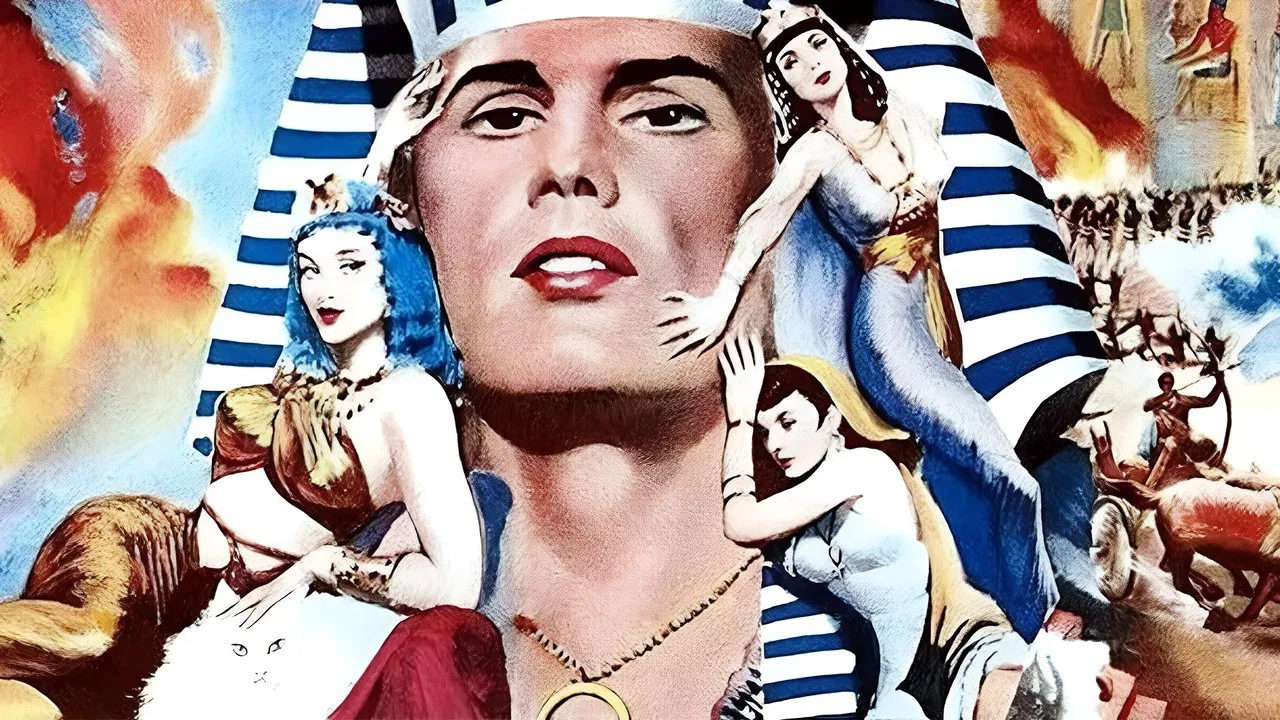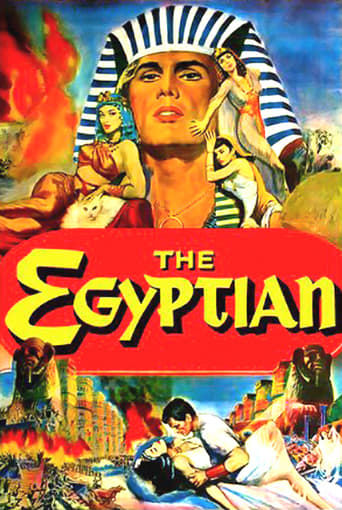

There is so much back story in this luscious looking movie that having not seen this in over 20 years, I had to research the basic plot of this political epic of the ancient worlds. It must have been an absolute sight for wide eyes in 1954 as the new CinemaScope format made itself known to movie audiences. It takes patience now to watch the story of doctor Edmund Purdom unfold, the saga of the secrets surrounding his birth, his friendship with Victor Mature, the unrequited love from Jean Simmons and his involvement with the deadly Bella Darvi, perhaps the most calculating of all ancient screen vixens. A revelation by the elderly Judith Evelyn changes his destiny, leading him closer to the pharaoh, his throne and destruction.Ancient sagas of this nature are fascinating as history as they are as costumed soap opera with family secrets, deadly plots and a quest for power guiding each of them. The bible shows many such sagas in its discussion of ancient history touching more nationalities than just the ancient Hebrews. The Greeks and Romans as well all had their sagas, but the Egyptians allegedly had the oldest of recorded histories. This is not biblical in any manner, but a greatly detailed account of life during the 18th Dynasty. Evelyn, reminding me of Judith Anderson, reveals much in her few scenes, like Anderson "the keeper of the secrets", and ultimately the character who explodes the plot forward.Gene Tierney, as her tough talking daughter, has a few good moments as well, but along with Jean Simmons is overshadowed by the alluring Darvi who even gives Joan Collins in "Land of the Pharaohs" a run for its gold. Purdom is more a reactor, thus seemingly wooden, while Michael Wilding never really gets to establish the character of the pharaoh. It's obvious to me that Tierney had what it took but was doomed by her gender. Peter Ustinov gets a showy part as one of Purdom's associates on the outside, but I'm still not really sure of his connection, the issue being far too many characters and too much to take in, certainly not as well defined as "The Ten Commandments".At a decent running time for an epic of this nature (just under two and a half hours), this is an opponent of riches much like a pharaoh's tomb, but frequently emotionally empty and far too much of a good thing. I still highly recommend it, but it must be seen, preferably on a large screen, when one is fully prepared to pay full attention. It's a difficult film to find in its wide- screen version, so avoid all pan and scans and wait patiently for it with the black bars at the top and bottom of the screen, hopefully a large one. To not have that format would be to miss a whole lot.
... View MoreFor many of the more highbrow producers, the holy grail of the 50s big picture was the so-called "intimate epic". Daryl F. Zanuck's production of The Egyptian opens with a spiel about the people of this ancient time being ordinary men and women, making this one of the earliest examples of a picture openly setting itself up for that lofty task.The human story of this epic is however unusually pessimistic, with its hero being ruined by his obsession for an evil woman, becoming a bitter rival to his best friend and losing the only woman who really loved him. This being the age of film noir, it's tempting to make parallels with pictures like Scarlet Street and Out of the Past. Of course, the femme fatale plot device is as old as Adam and Eve or Pandora's Box, but it is true that in the 50s there was a tendency for those cynical story lines to creep into the most unsuspecting of genres. There was also a convention in these ancient world epics of bringing Christian or Judeo-Christian philosophy into the picture (God not being a major figure in your typical film noir), although unusually The Egyptian is not a bible story. Instead it uses as its backdrop the rule of Akhenaton, a genuine historical figure who instated a brief period of monotheism in ancient Egypt. And oddly enough the conflation of Aton the sun deity with the Abrahamic God comes across as far more genuine and intelligent than, say, the rather dubious Easter story spin-off of The Robe, and its sermonising is far gentler than that of The Ten Commandments or Ben Hur.In the director's chair we have the highly-respected Michael Curtiz. Curtiz was in many ways a great choice because he was so adept at handling crowds and visual complexity, although old-timers like Curtiz (who made his debut in 1912) tended not to get on well with the cinemascope ratio. But while Curtiz continually makes the mistake of framing his actors from around the knees up as if they were in fullscreen, he balances out the extra width by keeping a lot of depth in his shots, occasionally highlighting the distant focal points for greater definition – such as the dancer in yellow in the bathhouse scene. Often he will place the deepest part of the shot to one side or another to give emphasis to that half of the screen. There's also some of his distinctive use of movement to drive the narrative forward smoothly. When we hear Edmund Purdom's voice-over telling us about the Jean Simmons character, the camera follows her, all the background business disappearing, with the exception of a single extra in one corner. This extra then gets to his feet, drawing our eyes to that corner, upon which the camera pans back to the right to reveal the procession announcing the pharaoh's death. This elaborate yet inconspicuous arrangement segues us neatly from one part of the story to the next.Unfortunately, that very mechanical nature of Curtiz's direction is not ideal for highlighting the acting performances. Then again, perhaps there is not much here to highlight. Lead man Purdom is by no means bad but he is astonishingly dull. This is a major failing with the picture because it becomes difficult to sympathise with him or believe in his actions. In contrast Jean Simmons and Victor Mature while not outstanding players at least had some character and intrigue about them. Thank goodness for Peter Ustinov, whose delightful and immaculate comic delivery here and there allows the movie to break free from its depressing austerity. There's also a colourful yet sadly short appearance by John Carradine as a grave robber. But while Ustinov and Carradine provide entertaining diversions, the only really strong dramatic performance is that of Gene Tierney, who gives a bit of realism to Baketamon, and actually manages to draw that line between folks ancient and modern as mentioned in the opening lines.The Egyptian is admittedly a noble effort to come up with an original and engaging spin on the ancient world epic. The trouble is it's not really enough of one thing or the other. The dramatic human story is simply not well-executed either by cast or crew, and while the whole production may be steeped in a look of authenticity, there is just not enough scope or spectacle to make this a satisfying epic either. The champions of the intimate big picture may have had high-minded intentions, but in truth the genre flourished most with the shameless splendour of Zimbalist and DeMille.
... View More...as valuable as King Tut's tomb! (OK, maybe not THAT valuable, but worth hunting down if you can). I notice no one has commented on this movie for some years, and I hope a fresh post will spark some new comments. This is a film that I remembered only snippets of from childhood, and only saw recently when I tired of waiting for Fox to honour its own past, and hunted down the Korean DVD (in English, but with unremovable Korean subtitles). I won't go through another long plot description - suffice to say that seeing it for the first time in its proper widescreen format left me agape at the vistas and the scope of the film. The matte paintings still hold up, and the palace sets are truly breathtaking. But it is the smaller scale details that lend this film its depth and richness, offering a glimpse into the lifestyles of Egypt's poor as well as its elite. The bazaars, hovels, docks, embalming houses, and taverns are as fascinating as Pharaoh's throne room. While errors abound on the large scale (most notably the dynastic succession), the details are more meticulously researched than the vast majority of Hollywood's films. Visually, it's not without its flaws - the interiors are often too overly lit and colourful to blend seamlessly with the exteriors. Nevertheless, this is a movie that should be credited for being as audacious in the small as it is in the large. Tedious? In parts, absolutely. Overacted? Underacted? Yes, both - though 'understated' might be a more apt description. Too long? Absolutely not. I wished they had spent more time with Sinuhe's experiences in the House of Death, and among the Hittites, and less with his 'romance' with Nefer, though. Historically inaccurate? Yes, that too, but so was Shakespeare. Nobody chastises him for it. I appreciate historical accuracy as much as the next guy, but ultimately it has to be remembered that cinema is theater, not a history lesson.
... View MoreThe philosophical, meditative tone of this movie renders it one of a kind. I'd give it 10 stars for that alone. That being said, though, what hit me with particular force was what I take, possibly incorrectly, to be its Art Direction. Many of the interior shots feature a rich concoction of color blends seemingly based on very understated Munsell Color Model progressions and complementary juxtapositions. This makes the movie probably unrealistic to contemporary eyes, but, to me, very beautiful as an aesthetic work in itself. I think this movie is genuinely unique for this quality, and if for no other reason, earns it a full, careful, digital restoration. Fox, are you listening?
... View More